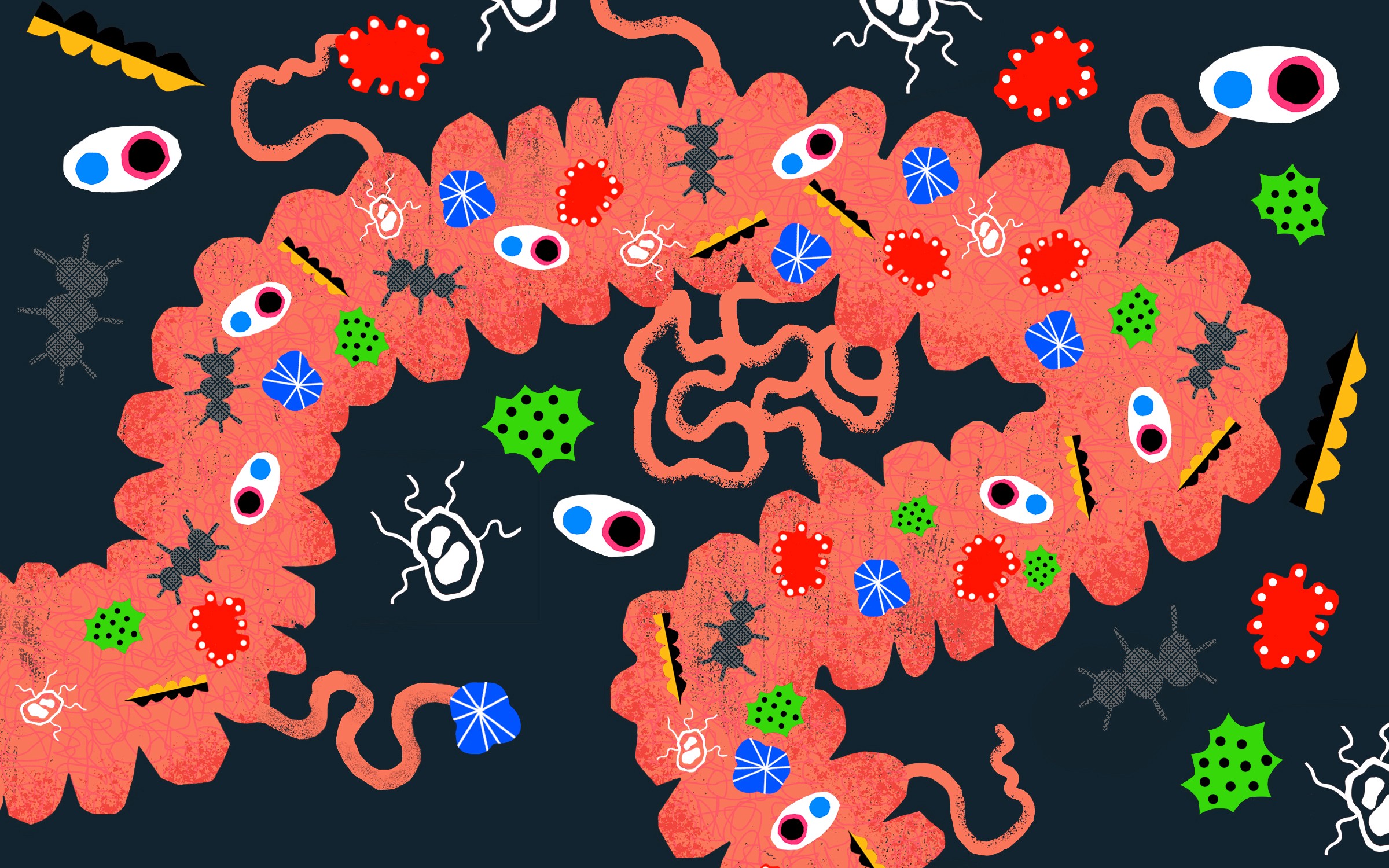Listen to this story
–:–
–:–
The disease du jour has become a catchall for all kinds of health problems. But is a ?leaky gut? really that bad?
 Illustration: James Daw
Illustration: James Daw
 There are oodles of #leakygut posts on Twitter, Instagram, and Facebook, many involving graphics and videos that purport to explain how it works and promise ways to heal it. But before you trust your gut to social media, know this: You definitely have a leaky gut. Everyone does. In fact, intestinal permeability, as it?s known medically, is normal. Until it?s not. If too much stuff passes from the digestive system into the blood, or if the wrong things get through, like harmful bacteria, infections and diseases may ensue ? at least in theory.
There are oodles of #leakygut posts on Twitter, Instagram, and Facebook, many involving graphics and videos that purport to explain how it works and promise ways to heal it. But before you trust your gut to social media, know this: You definitely have a leaky gut. Everyone does. In fact, intestinal permeability, as it?s known medically, is normal. Until it?s not. If too much stuff passes from the digestive system into the blood, or if the wrong things get through, like harmful bacteria, infections and diseases may ensue ? at least in theory.
But hyperpermeability ? the scientific term for ?leaky gut syndrome??has not yet been proven to cause any human diseases. Rather, this supposed disease du jour is but one actor with a role in a multi-act interplay of body systems related to numerous chronic human ills. Among the conditions possibly related to leaky gut, according to several studies and interviews with multiple researchers: obesity, diabetes, heart failure, irritable bowel syndrome, multiple sclerosis, autism, celiac disease, cancer, and Crohn?s, Parkinson?s, and Alzheimer?s disease.
Some proponents of leaky gut syndrome say, without solid evidence, that it causes a range of other problems, from gas, bloating, and cramps to joint pain, moodiness, and poor sleep.
?Leaky gut is a syndrome that may be associated with any disease, acute or chronic, that affects intestinal wall function and therefore increases gut-to-blood penetration of microbiota-produced compounds,? says Marcin Ufnal, MD, PhD, who leads the Department of Experimental Physiology and Pathophysiology at the Medical University of Warsaw in Poland.
?Leaky gut syndrome is the belief that a leaky gut is the source of all ailments and diseases.?
But in addition to whatever it might cause, hyperpermeability is also thought to be caused by several common diseases, including high blood pressure, heart disease, and diabetes ? three conditions that damage blood vessels and nerves of the intestinal wall ? as well as inflammatory bowel disease, Ufnal tells Elemental. One study even suggests marital spats could spring gut leaks. Couples were led into arguments while researchers looked on and then drew post-fight blood. The most hostile men and women had higher levels of a biomarker for increased gut permeability.
Ufnal acknowledges that ?leaky gut? is not a scientific term. ?However, it is commonly used not only by laypersons but also by scientists,? he says, so he uses it when explaining the condition to the general public.
Whatever you call it, much remains unknown about an overly permeable gut?s complex chicken-or-egg interactions with the body?s many organs, the immune system, and the entire ecosystem living in the stomach and bowels.
?A mind of its own?
Before food can power your body, digested nutrients must seep out of the gastrointestinal (GI) tract and into the bloodstream, like fine soil sifting through a mesh that blocks dirt clods. There?s a lot of room, and time, for things to go wrong: The core of the gut, including the stomach and intestines, has some 4,000 square feet of surface area ? equal to the floor space of a suburban McMansion. Here?s how it works, when all goes well:
- Food and drink slides down the esophagus into the stomach, where it breaks down amid stomach acid and digestive enzymes. From there, it moves into the bowels (two separate intestines).
- In the 20-foot-long, roughly one-inch-wide small intestine, the food and liquids mix with additional digestive juices. The walls of the small intestine, mesh-like and necessarily permeable, absorb water and nutrients into the bloodstream.
- What remains after six to eight hours ? largely waste including undigested food and some old cells that slough off from the inner linings of the GI tract above ? enters the large intestine, also called the colon, some five feet long and three inches in diameter. Over the next 30 to 40 hours, more water is absorbed, turning the waste into a semisolid stool before it reaches the rectum, where it hangs out until you go.
The gut is full of chemicals and microorganisms ? including viruses, yeast, and fungi, plus more than 1,000 species of bacteria ? which make up a vast ecosystem called the microbiome, digesting food and extracting nutrients and working in concert with the immune system and the various organs to essentially ?run the body.? The whole setup is a starting point of reaction to drugs, food, and even exercise.
?The gut really has a mind of its own,? says Purna C. Kashyap, MBBS, a gastroenterologist at the Mayo Clinic in Rochester, Minnesota. ?It has a separate nervous system that is potentially even more complex than the brain.?
Suspected causes
The gut makes vital compounds like vitamins and fatty acids, but it also produces toxins like ammonia, Ufnal explains. ?The bloodstream concentration of these helpful and harmful substances depends on a properly functioning intestinal wall.?
Hyperpermeability (leaky gut) does not automatically equal disease, however. The liver and kidneys are protective mechanisms that defend against harmful toxins. ?If the two are in perfect condition, the symptoms of leaky gut may not be present,? Ufnal says. If not, bacteria can circulate through the bloodstream and ?may deteriorate underlying disease? and/or ?promote the development of a variety of health disorders.?
Genes also play a role. ?Although there is still a lot to understand, we know that in genetically susceptible individuals, alterations in the composition of the gut microbiota and/or gluten ingestion can affect gut permeability, allowing increased trafficking of molecules? from the gut to the bloodstream ?and onset of chronic inflammation,? explains Maria Fiorentino, PhD, of the Center for Celiac Research and Treatment and the Mucosal Immunology and Biology Research Center at Massachusetts General Hospital.
Inflammation is a catchall term used to describe when bodily tissues are flooded with cells or cell parts to battle disease or injury, or when this process runs amok and becomes harmful on its own.
Fiorentino and colleagues studied mice to discover that a protein called zonulin, which modulates permeability in the intestinal walls, plays a role in determining whether and to what extent disease-related inflammation progresses. Two groups of mice, one genetically engineered to produce zonulin and one not, were stressed with chemicals to induce colitis, a chronic and painful inflammation of the colon. ?The zonulin transgenic mice showed a remarkable increase in colon inflammation and in mortality ? up to 70% ? compared to normal mice, that was reversed by blocking zonulin effect with a specific inhibitor,? says Alessio Fasano, MD, a researcher at Massachusetts General Hospital and senior author of the 2017 study, detailed in the Annals of the New York Academy of Sciences.
?This is clear evidence that defects in gut-barrier function contribute to the onset of inflammatory diseases,? Fiorentino says.
In a new study, published in Frontiers in Immunology, the same researchers, with other colleagues, found just how interrelated all these systems are, again in zonulin-expressing mice: ?Zonulin-dependent gut-barrier defects are critically involved at birth in the development of an immune system and a gut microbiota skewed toward inflammation,? Fiorentino says.
Emerging evidence suggests prevention of intestinal hyperpermeability involves, at least in part, doing the same things that promote good health overall: eating right and exercising.
Research points to Western diets, rich in red meat and animal fats in general and poor in fiber, as a potential contributor to gut hyperpermeability, Fiorentino says. And there are many other likely culprits, she says, including excessive alcohol consumption, processed foods, and NSAIDs like aspirin and ibuprofen. Stress, too, may play a role. ?Acute and chronic stress have been shown to change intestinal barrier function in animal models, and psychological stress is reported to influence the clinical course of chronic intestinal disorders, including inflammatory bowel disease and irritable bowel syndrome in humans,? Fiorentino says.
One small study last year involving analysis of fitness levels and stool samples of 37 people suggests that exercise boosts production of ?good? bacteria, which fuel processes that ?help strengthen the intestinal lining and help prevent leaky gut syndrome.?
Since research into hyperpermeability is in the early years, much of what?s known and speculated comes from animal studies, even among flies. A study last year in the journal PLOS Genetics found that, at least in flies, intestinal permeability increases with age, as intestinal epithelial cells, the health of which is vital to the intestinal-blood barrier, die at a faster rate. The research also found evidence that exercise and a healthy diet high in fruits, vegetables, whole grains, legumes, and seeds can help prevent hyperpermeability.
In studies of worms, flies, and rodents, ?we see an increase in intestinal permeability with age that correlates with health span and life span,? says Mark Watson, PhD, a scientist at the Buck Institute for Research on Aging who worked on the fly study. Animal studies have also shown that intestinal permeability can allow bacteria to pass from the colon into the bloodstream, then colonize various organs ?leading to detrimental effects,? Watson says.
Rats and mice, and even flies, can be good models for studying human disease, but they?re not perfect, Watson points out. And when diseases are linked to a leaky gut in humans, that ?doesn?t mean it is causative, and this is where we find ourselves stumped,? he says.
A bottom line
The evidence points to an array of answers and prompts leading health organizations to issue cautions about any diagnosis of leaky gut, which is ?more likely to leave patients untreated for what really ails them,? says the Canadian Society of Intestinal Research. The U.K.?s National Health Service puts it this way: ?There is currently little evidence to support the theory that a porous bowel is the direct cause of any significant, widespread problems. There is also little evidence that the ?treatments? some people claim help to reduce bowel leakiness, such as nutritional supplements and herbal remedies, have any beneficial effect for most of the conditions they supposedly help.?
?I think intestinal hyperpermeability is a real phenomenon,? Watson says. ?However, I think in some cases, it can be a result of an already instigated disease, therefore correlative, and in some cases, I think it can definitely be causative.?
Meanwhile, Watson worries that some scientists are using ?leaky gut syndrome? as a buzzword to grab attention, and that its use could lead to public misperception. ??Leaky gut syndrome? is the belief that a leaky gut is the source of all ailments and diseases,? he says. ?There is no solid evidence on this, and it is most likely untrue, though there is some evidence that some ailments and diseases may be initiated via this route.?


